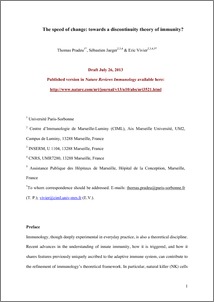Pradeu, Thomas and Jaeger, Sébastien and Vivier, Eric
(2013)
The speed of change: towards a discontinuity theory of immunity?
Nature Reviews Immunology, 13.
pp. 764-769.
![[img]](https://philsci-archive.pitt.edu/style/images/fileicons/application_pdf.png)  Preview |
|
PDF
Pradeu-Jaeger-Vivier_Discontinuity_theory_Final_draft.pdf
- Accepted Version
Download (1MB)
|
Abstract
Immunology, though deeply experimental in everyday practice, is also a theoretical discipline. Recent advances in the understanding of innate immunity, how it is triggered, and how it shares features previously uniquely ascribed to the adaptive immune system, can contribute to the refinement of immunology’s theoretical framework. In particular, natural killer (NK) cells and macrophages are activated by transient modifications, but adapt to long-lasting modifications that occur in the surrounding tissue environment. This process allows the maintenance of self-tolerance while permitting efficient immune responses. Extending this idea to other components of the immune system, we propose here some general principles that lay the ground for a unifying account of immunity, the discontinuity theory. According to this theoretical framework, effector immune responses (i.e., activated responses that lead to the potential elimination of the target antigen) are triggered by an antigenic discontinuity, that is, by the sudden modification of molecular motifs with which immune cells interact.
Monthly Views for the past 3 years
Monthly Downloads for the past 3 years
Plum Analytics
Actions (login required)
 |
View Item |



